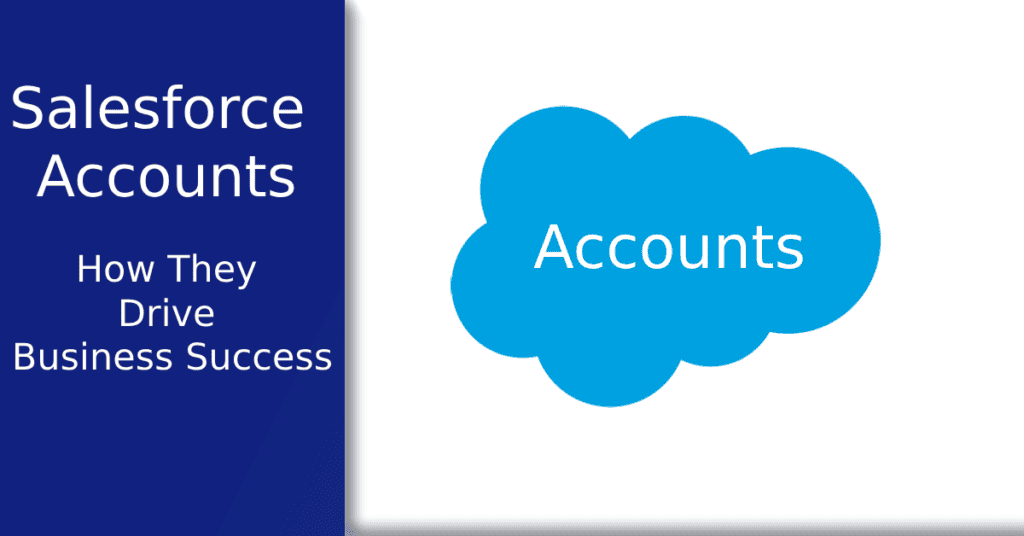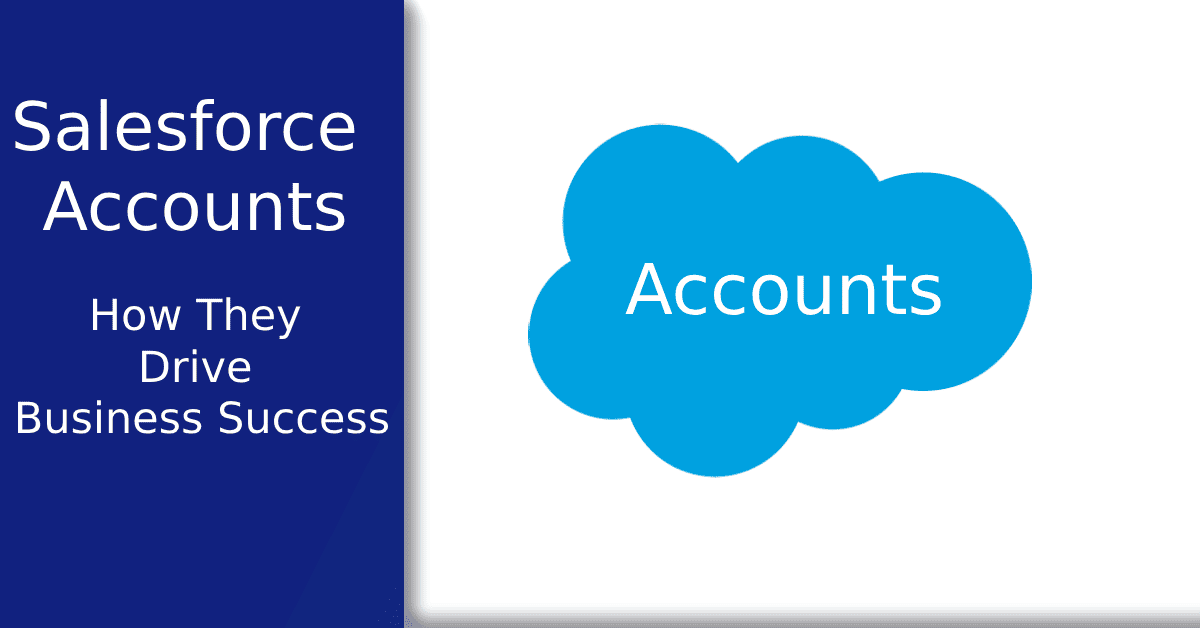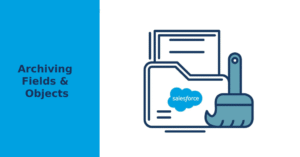
What are Salesforce Accounts? They are entities used to store information about individual customers, organizations, or business contacts. They serve as a central repository for managing customer data, interactions, and relationships, enabling businesses to effectively track and engage with their customers.
Welcome to my comprehensive guide on Salesforce Accounts and their significance in driving business success. In this article, we will explore the fundamental aspects of Salesforce accounts, their key elements, and the benefits they offer. By understanding the role of Salesforce accounts and implementing effective strategies, businesses can optimize their customer relationship management and achieve their growth objectives.
What are Salesforce Accounts?
Salesforce accounts are entities within the Salesforce platform that represent organizations or individual customers with whom a business interacts. Accounts serve as a central repository for storing and managing crucial information about customers, including their contact details, preferences, purchase history, and interactions with the business. By leveraging Salesforce accounts, businesses can gain a holistic view of their customers, enabling personalized engagements, effective sales strategies, and improved customer satisfaction.
Understanding Salesforce Accounts
To fully grasp the power of Salesforce accounts, it is essential to understand their key elements. These elements include:
- Account Information: Salesforce accounts provide a comprehensive record of customer information, such as company name, address, phone numbers, and primary contact details. This data facilitates seamless communication and personalized interactions with customers, leading to stronger relationships and increased sales opportunities.
- Account Hierarchy: Salesforce allows the creation of hierarchical structures within accounts, representing parent-child relationships. This hierarchy is especially useful for businesses dealing with complex organizational structures or multiple branches. It enables businesses to manage relationships at different levels, streamline sales processes, and ensure effective communication across various departments or subsidiaries.
- Account Ownership: Enables businesses to assign ownership of accounts to specific individuals or teams within the organization. This ownership ensures accountability and clear responsibility for managing customer relationships. By assigning ownership, businesses can streamline collaboration, track progress, and deliver consistent customer experiences.
- Account Relationships: In addition to individual accounts, Salesforce provides the ability to establish relationships between accounts. This feature is particularly valuable when dealing with business-to-business (B2B) sales, where multiple organizations are involved. By mapping and managing these relationships, businesses can enhance account-based marketing and sales strategies, identify cross-selling or upselling opportunities, and foster collaborative partnerships.
Benefits of using Salesforce Accounts
Utilizing Salesforce accounts offers several benefits for businesses:
- Comprehensive Customer Insights: Consolidate customer data, providing a 360-degree view of their interactions, preferences, and purchase history. This holistic perspective allows businesses to understand customer needs, personalize engagements, and deliver exceptional experiences.
- Streamlined Sales Processes: Salesforce accounts streamline the sales journey by organizing customer information, tracking sales activities, and managing opportunities within the platform. This centralized approach ensures sales teams have access to accurate and up-to-date information, enabling efficient sales processes and better conversion rates.
- Enhanced Collaboration: Salesforce accounts facilitate collaboration among team members across different departments. By sharing account information, sales, marketing, and customer service teams can align their efforts, coordinate actions, and provide a consistent customer experience. This collaboration strengthens customer relationships and maximizes business outcomes.
- Scalable Account Management: As businesses grow, managing customer relationships becomes increasingly complex. With Salesforce’s robust features and automation capabilities, businesses can effectively manage accounts at scale, ensuring consistent and personalized interactions with customers.
What Are Some Use Cases of Salesforce Accounts?
Salesforce accounts find applications across various industries and business models. Some common use cases include:
- Business-to-Business (B2B) Sales: Salesforce accounts are instrumental in managing complex B2B sales cycles involving multiple decision-makers and stakeholders. By capturing and organizing account information, businesses can nurture relationships, track sales opportunities, and close deals more effectively.
- Account-Based Marketing (ABM): ABM strategies focus on targeting and engaging specific high-value accounts. Salesforce accounts provide the foundation for ABM initiatives, enabling businesses to segment and prioritize based on criteria such as revenue potential, industry, or geographic location. This targeted approach increases marketing efficiency and drives better engagement with key accounts.
- Customer Success Management: Salesforce accounts play a vital role in customer success management, allowing businesses to proactively monitor and address customer needs. By tracking account interactions, customer feedback, and support requests, businesses can identify potential issues, deliver timely solutions, and foster long-term customer loyalty.
How do I Manage Salesforce Accounts?
Creating and managing involves the following steps:
- Account Creation: Users can create new accounts by entering relevant account information, such as the company name, address, and contact details. It is essential to ensure data accuracy and completeness during the account creation process to avoid any future complications.
- Data Import: For businesses with existing customer data, Salesforce provides data import capabilities, allowing bulk importation of account information. This ensures a smooth transition from legacy systems to Salesforce, maintaining historical customer data and preserving business continuity.
- Account Updating: Regularly updating account information is crucial to maintaining data accuracy and relevance. Businesses should establish processes and schedules to review and update account details, ensuring the information is up-to-date and reflects any changes in customer status or preferences.
- Account Segmentation: Salesforce offers robust segmentation capabilities, allowing businesses to categorize based on specific criteria. By segmenting accounts, businesses can tailor their marketing and sales strategies to target specific customer segments effectively.
What Are Some Strategies to Optimize Salesforce Accounts?
To optimize and drive business success, consider the following strategies:
- Personalization: Leverage the customer information stored to deliver personalized experiences. Tailor marketing messages, sales pitches, and customer support interactions based on individual account details and preferences. Personalization enhances engagement, builds trust, and increases the likelihood of conversions.
- Cross-Selling and Upselling: By analyzing Salesforce account data, businesses can identify cross-selling and upselling opportunities. Understand customer needs, previous purchases, and patterns to recommend relevant products or services. This approach maximizes revenue potential and strengthens customer relationships.
- Sales Pipeline Management: Utilize Salesforce’s pipeline management features to track and manage opportunities associated with accounts. By effectively managing the sales pipeline, businesses can identify bottlenecks, prioritize leads, and forecast revenue more accurately.
- Automation and Integration: Leverage Salesforce’s automation capabilities and integration with other business tools to streamline account management processes. Automate routine tasks, such as data updates or notifications, to save time and improve efficiency. Integrating Salesforce with marketing automation or customer support systems ensures a seamless flow of information and consistent customer experiences.
What Are Some Common Challenges with Accounts?
While Salesforce accounts offer numerous benefits, businesses may encounter certain challenges. Here are a few common challenges and strategies to overcome them:
- Data Quality and Integrity: Maintaining accurate and reliable data within Salesforce accounts is crucial. Implement data hygiene practices, such as regular data cleansing, deduplication, and validation, to ensure data quality and integrity. Automated data validation rules and periodic data audits can help maintain data accuracy.
- Adoption and User Training: Ensure proper user adoption and provide comprehensive training to maximize the potential of Salesforce accounts. Offer training programs, documentation, and ongoing support to help users understand the features and functionalities of Salesforce. User engagement and training can significantly enhance the effectiveness of Salesforce accounts.
- System Integration: Integrating with other business systems, such as marketing automation or ERP platforms, can be challenging. Collaborate with IT teams or Salesforce consultants to plan and execute seamless integrations, ensuring data consistency and enabling efficient workflows.
- Change Management: Proper change management practices, including clear communication, stakeholder engagement, and training, can facilitate smooth transitions and minimize resistance to change.
Salesforce Accounts Conclusion
Salesforce accounts play a crucial role in managing customer relationships, driving sales growth, and delivering exceptional customer experiences. By understanding the fundamentals, implementing effective strategies, and leveraging Salesforce’s features and capabilities, businesses can optimize their account management processes and achieve greater success.
Continue Learning
Embrace the journey of continuous learning and open the doors to endless growth, new opportunities, and the realization of your full potential. Start today and keep expanding your knowledge to pave the way for a brighter future.
Learn with Justin Pena the Salesforce Consultant
Don’t stop learning about Salesforce, checkout my other 2023 Salesforce Comprehensive Guides on various topics.
Learn from Trailhead Resources
If you are interested in getting hands-on experience, I recommend checking out the Trailhead module on Accounts. It provides interactive tutorials and exercises to help you further enhance your understanding and skills in managing Salesforce Accounts.
Salesforce Account FAQs
❓What is the difference between user and account in Salesforce?
In Salesforce, a user represents an individual who has access to the platform and performs actions, while an account represents a customer or organization that has a business relationship with the company.
Read my full article on Salesforce Users.
❓Why is account used in Salesforce?
Accounts are used in Salesforce to track and manage customer relationships, consolidate related contacts and opportunities, and provide a comprehensive view of interactions, transactions, and communication history with customers or organizations.
❓What are the two types of accounts in Salesforce?
The two types of accounts in Salesforce are individual/personal accounts and business accounts.
❓How do I get a Salesforce account?
To get a Salesforce account, you can sign up for a free trial or contact Salesforce sales for a paid account.




